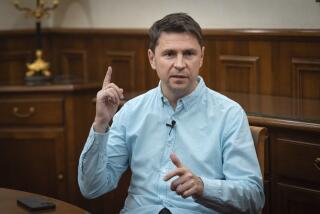Soviet Premier Predicts Disaster if Radical Economic Plan Wins Out : Restructuring: Ryzhkov calls for a compromise to keep from plunging the nation into chaos.
- Share via
MOSCOW — Soviet Prime Minister Nikolai I. Ryzhkov, fighting radical proposals for sweeping economic changes, appealed Sunday to the country’s lawmakers to reject a program, endorsed by President Mikhail S. Gorbachev, that would bring a quick end to state management of the economy.
Warning that an overnight end to state ownership of industry and agriculture and government central planning would plunge the Soviet Union into chaos, Ryzhkov called for a compromise that would ensure the gradual development of a market economy but without further jeopardizing the country’s stability.
With a vote possible this week in the Supreme Soviet, the country’s legislature, on two rival reform programs--the radicals’ plan for a 500-day transformation of the Soviet economy and his own plan for a gradual transition--Ryzhkov urged the utmost caution in making what will be a fundamental change for the Soviet Union.
“The country is not ready for a sharp swerve,” Ryzhkov said in an interview on national television. “We are not ready to transfer to a new (economic) system, neither psychologically nor organizationally. . . . The market means freedom, but we have been working in a system based on direction and (central) administration. . . .
“It is impossible to shift to a market economy in 100 days or 500 days. This is not realistic. This is only the beginning of the transition, and the transition will take years, not days. One cannot calculate this in days or months.”
Leonid I. Abalkin, the Soviet vice premier in charge of economic reform, was equally blunt as the government, faced with likely defeat in the Supreme Soviet, mounted an open counterattack following the radicals’ success in winning Gorbachev’s support, equivocal and wavering though it has been.
The country’s economic situation is so perilous, Abalkin told the conservative newspaper Sovetskaya Rossiya, that “we are at the edge of an abyss. Any careless move can push us over. We have to appeal to people’s reason.”
Both the measures and the timetable in the radicals program are unrealistic, Abalkin said, arguing that it is “simply impossible to restructure everything in weeks, months and maybe even years.”
Abalkin suggested that the radicals’ proposals, dubbed the Shatalin Program after Gorbachev adviser Stanislav S. Shatalin, the principal author, amount to little more than what in American politics a few years ago might have been called voodoo economics.
“People are being assured that there is a miraculous means--and our people trust and believe in miracles--by which they can move forward without plan, sacrifice or shocks, without decreasing their standard of living or increasing prices,” Abalkin said.
“In such crisis situations, people begin to believe en masse in all sorts of things--extraterrestrial beings, UFOs, extrasensory phenomena. The 500-day program also contains a certain mysterious element. The idea of its miraculous power has been pushed consistently into the mass consciousness, but nobody has seen it.”
At the same time, he said, “People are not ready to work in new conditions. Political instability in society, the activity of certain (political) forces, growing national separatism should also be kept in mind.
“All this leads us to conclude,” Abalkin said, “that if we move too fast and do not consider the possible consequences, it can result in a greater crisis in the economy and kill any desire to attempt reforms in the near future.”
The government has specific, realistic plans for a step-by-step transition to a market economy, he said. Among the immediate measures are increased prices for agricultural produce in an effort to stimulate the production of food and of some raw materials for industry.
Embattled with calls countrywide for his resignation, Ryzhkov acknowledged the appeal that the radicals’ proposals have because of their promise of swift improvement in the current economic crisis.
Although the government is convinced that its approach is correct, it is willing to discuss the speed and ways that a market economy is developed to replace that which the state has run for seven decades, he said.
“To my mind, we will come to some compromise,” Ryzhkov said. “We have to take both programs and try to put them together.”
Ryzhkov said that another basic difference, in addition to the speed of change, between his program and that of the radicals is the political character of the Soviet Union in the future as a federal state.
While he envisions “a strong, united sovereign state” made up of constituent republics, the radicals believe it should be “a kind of an economic union of completely independent states united on the basis of certain interests,” Ryzhkov said.
“This profoundly changes the approach to our country’s future,” he said. “Our concept is based on the assumption of building an economy that would unite the country and enable us to take advantage of our vast territory and riches.”
The Shatalin plan is “essentially based on the recognition of the liquidation of the Soviet Union as a state,” Abalkin said, arguing that it would no longer be a political but an economic union like that of the European Community or Comecon, the socialist trading bloc.
But the radicals continued to seek support for their fast-change approach.
“If we are late, we will lose everything,” said Mikhail Poltoranin, the information minister for the Russian Federation, which has already adopted the 500-day program. “We are coming closer to 1991 and, as far as I know, the expected deficit in the state budget will grow to 340 billion rubles ($544 billion at official exchange rates). That is our death.”
More to Read
Sign up for Essential California
The most important California stories and recommendations in your inbox every morning.
You may occasionally receive promotional content from the Los Angeles Times.













